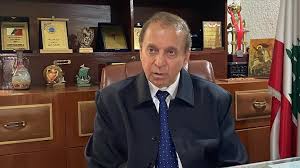The Minister of the Displaced in the Lebanese caretaker government, Issam Sharafeddine, asserted on Saturday that European Union countries shamelessly voted to retain displaced Syrians in Lebanon, refusing to establish a tripartite committee and declining to provide aid within Syrian borders, while also showing reluctance to contribute to Syria’s reconstruction efforts.
Under Sharafeddine’s guidance, the Lebanese Ministry of the Displaced organized a workshop titled “Convoys of Safe Voluntary Return to Syria” at the Byblos municipality building. The event, attended by numerous Lebanese officials alongside Sharafeddine, was reported by the Lebanese website Lebanon 24.
During the workshop, Sharafeddine emphasized in his address that municipalities serve as the primary authority in managing the presence of displaced Syrians until their full repatriation. He noted that despite the significant challenges posed by the massive Syrian displacement, there exists a broad national, political, parliamentary, and religious consensus on the dangers associated with hosting such a large number of displaced individuals, encompassing economic, educational, health, environmental, and security concerns.
Wave of Attacks Against Syrians in Lebanon: Opposition Criticizes, Regime Silent
Sharafeddine outlined three categories of the Syrian presence: workers, craftsmen, and business owners; individuals displaced due to conflict or economic reasons (comprising the majority); and opposition political refugees and armed individuals.
Regarding those displaced due to conflict or economic reasons, Sharafeddine indicated, “They constitute the largest group, and the Ministry of the Displaced’s plan focuses on their gradual and organized repatriation at a rate of 15,000 individuals per month. This plan, agreed upon by the Ministry of Local Administration in Syria and endorsed by the Lebanese government, has unfortunately not been implemented due to lacking political decisions.”
Concerning opposition political refugees and armed individuals, Sharafeddine outlined three potential options: availing themselves of presidential pardons and returning to Syria, resettlement in a third country according to international norms and agreements, or applying pressure on obstructive donor countries, such as the United States, Western European nations, and the UNHCR, to adhere to international standards regarding Syrian refugee reception.
He criticized the European Union’s stance, stating, “With 750 million inhabitants, Europe refuses to accommodate a million displaced Syrians and instead insists on Lebanon bearing the burden. The EU’s refusal to form a tripartite committee, provide aid within Syria, and contribute to reconstruction is brazen.”
Sharafeddine attributed the delay in displaced Syrians’ return to Lebanon to pressure exerted by the United Nations and donor countries, which influenced the UNHCR’s stance, hindering repatriation efforts.
He highlighted the UNHCR’s refusal, under pressure from these countries, to engage in a tripartite committee involving Lebanon and Syria aimed at facilitating the return of displaced Syrians.
Sharafeddine proposed the idea of “opening sea ports as an option,” suggesting, “Ships could transport displaced individuals to Europe after ensuring their safety, aiming to pressure European countries to address their responsibilities in this matter. International and moral obligations dictate that they bear the consequences of asylum and contribute to Syria’s reconstruction.”
Sharafeddine mentioned that protocols have been established for those intending to return, submitted to the Director General of Lebanese General Security and subsequently to the National Security Office in Syria for name scrutiny, expressing hope for a prompt response.
This article was translated and edited by The Syrian Observer. The Syrian Observer has not verified the content of this story. Responsibility for the information and views set out in this article lies entirely with the author.


